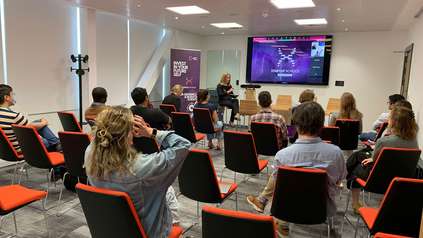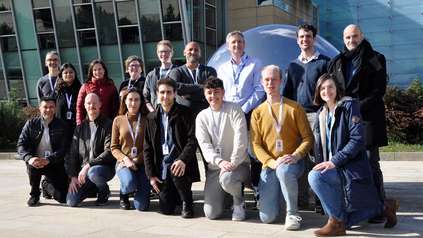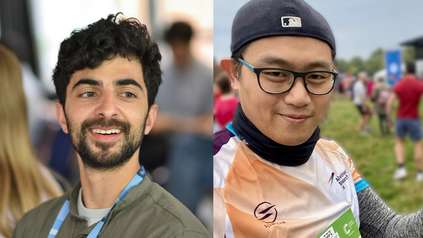Pioneering cancer plasticity atlas will help predict response to cancer therapies
Listen to this news story:
Listen to “Pioneering cancer plasticity atlas will help predict response to cancer therapies” on Spreaker.
The Wellcome Sanger Institute, Parse Biosciences and the Computational Health Center at Helmholtz Munich announce today (12 June) a collaboration to build the foundation of a single cell atlas, focused on understanding and elucidating cancer plasticity in response to therapies. The collaboration will catalyse an ambitious future phase to develop a cancer plasticity atlas encompassing hundreds of millions of cells.
Utilising novel organoid perturbation and Artificial Intelligence (AI) platforms, the aim is to create a comprehensive dataset to fuel foundational drug discovery models and cancer research.
Dr Mathew Garnett, Group Leader at the Sanger Institute, and Professor Fabian Theis, Director of the Computational Health Center at Helmholtz Munich and Associate Faculty at the Sanger Institute, will be the principal investigators in the collaboration.
Mathew’s research team has generated novel 3D organoid cultures that serve as highly scalable and functional cancer models with the ability to capture hallmarks of patient tumours. The team will use vast numbers of these tumour organoids – mini tumours in a dish – as a model to better understand cancer mechanisms of plasticity and adaptability in response to treatments.
Fabian’s research team has been widely recognised for pioneering computational algorithms to solve complex biological challenges at the intersection of Artificial Intelligence and single-cell genomics, in particular in this context for in silico modelling of drug effects on cellular systems. The initiative will be run through Parse Biosciences’ GigaLab, a state-of-the-art facility purpose-built for the generation of massive scale single-cell RNA sequencing datasets at unprecedented speed.
The Sanger, Helmholtz Munich and Parse teams have developed automated methods to streamline laboratory procedures in addition to the computational methods required to analyse and discover insights within datasets of this size.
The ultimate aim of the collaboration is to build a single-cell reference map that will enable virtual cell modelling and potentially help predict the effect of drugs in cancer patients – where resistance might develop, from which compounds and where to target future treatment efforts.
“We have developed a transformational platform to enable both large-scale organoid screening and the downstream data generation and analysis which has the potential to redefine our understanding of therapeutic responses in cancer. We aim to develop a community that brings the best expertise from academia and industry to progress the project. Studies of this magnitude are critical to the development of foundational models to better help us understand cancer progression and bring much needed advancement in the field.”
Dr Mathew Garnett, Group Leader at the Wellcome Sanger Institute and collaboration co-lead
“Our vision of a virtual cell perturbation model is becoming increasingly feasible with recent advances in AI — but to scale effectively, we need large, high-quality single-cell perturbation datasets. This collaboration enables that scale, and I’m excited to move toward AI-driven experimental design in drug discovery.”
Professor Fabian Theis, Director of the Computational Health Center at Helmholtz Munich and collaboration co-lead
“We are incredibly excited to bring the power of GigaLab to visionary partners. Leveraging Parse’s Evercode chemistry, the GigaLab can rapidly produce large single-cell datasets with exceptional quality. Combining the expertise of the Wellcome Sanger Institute and Helmholtz Munich with the speed and scale achieved by the GigaLab enable the opportunity to fundamentally change our understanding of cancer.”
Dr Charlie Roco, Chief Technology Officer at Parse Biosciences
More information
About Parse Biosciences
Parse Biosciences is a global life sciences company whose mission is to accelerate progress in human health and scientific research. Empowering researchers to perform single cell sequencing with unprecedented scale and ease, its pioneering approach has enabled groundbreaking discoveries in cancer treatment, tissue repair, stem cell therapy, kidney and liver disease, brain development, and the immune system.
With technology developed at the University of Washington by co-founders Alex Rosenberg and Charles Roco, Parse has raised over $100 million in capital and is used by over 2,500 customers across the world. Its growing portfolio of products includes Evercode™ Whole Transcriptome, Evercode™ TCR, Evercode™ BCR, Gene Select, and a solution for data analysis, Trailmaker™.
Parse Biosciences is based in Seattle’s vibrant South Lake Union district, where it recently expanded into a new headquarters and state-of-the-art laboratory. To learn more, please visit https://www.parsebiosciences.com/.





